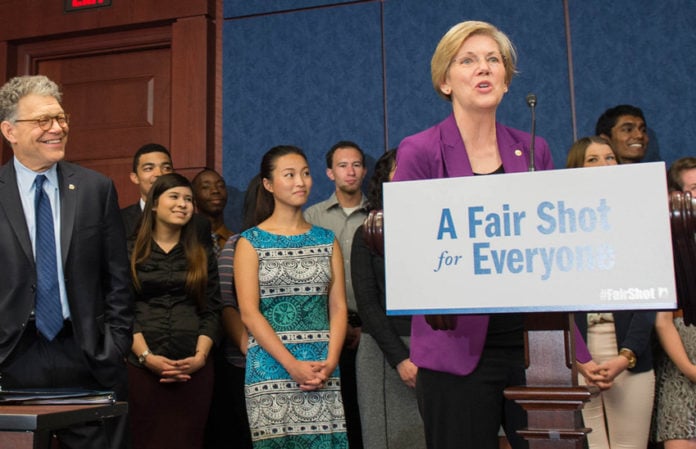When she took the Senate floor to rail against President Barak Obama’s plea for unity on the recently passed $1.1 trillion omnibus-spending bill, Sen. Elizabeth Warren (D-MA) burnished her reputation as the Left’s new leader going into the 2016 presidential election campaign.
Warren’s opposition to the bill made strange bedfellows in conservative Senator’s Ted Cruz (R-TX), Rand Paul (R-KY) and Mike Lee (R-UT) but for different reasons.
Senators Cruz, Paul and Lee vehemently rejected the omnibus spending bill because it funded ObamaCare and President Obama’s “executive action” amnesty for illegal aliens while raising the debt limit through next September – sharply reducing the leverage Republicans will have when the new House and Senate – controlled by Republicans – convenes in January.
Warren opposed in the bill because it would weaken the onerous regulations placed on businesses by the Dodd-Frank Wall Street Reform law.
The reforms placed the blame for the 2008 financial meltdown not on Congress that pressured lenders to grant loans to homebuyers who could not afford to pay them back but on hedge funds that had to package the loans for sale in investment markets.
The fact that Warren was willing to go up against outgoing Senate Majority Leader Harry Reid and President Obama in opposing the bill sent her to the top of the list of possible democratic presidential hopefuls with fully 300 senior Obama 2008-2012 campaign pols lined up to launch a campaign should Warren give the nod.
This is all bad news for Hillary.
Having had two terms of Bill Clinton as president and having lost the 2008 nomination fight to upstart Barak Obama, everyone agrees that Hillary fatigue is setting in – and the evidence is all around us.
She has been widely criticized for making the claim of poverty after she and Bill left the White House and for engaging in race and gender politics so early in the current campaign.
What’s more, her much promoted book tour was lackluster a best and she is failing to fill venues reserved for major speeches and policy town halls – venues she easily filled when she was the 2008 heir apparent before Obama threw his hat into the ring.
If she loses the nomination next year or wins it by a slim margin after a punishing primary fight she will not be able to move to the center fast enough to win against virtually any Republican opponent – meaning her chance of ever becoming president will have passed.
That’s why a Warren candidacy is so attractive.
Like Obama (and unlike Hillary), she has no record to run on. She is a first term Senator from a deep blue state. She speaks charismatically about her “vision” for the country without media criticism. And it is not hard to believe the nomination may be hers to lose if she decides to enter the race next year.
The next big test for Hillary will be the timing of her official entry into the race. She would like to hold off until late in 2015 spending the year raising money and test drive messages in her stump speeches.
If she waits too long to announce her candidacy, Warren might eclipse her. If she jumps in too soon, it complicates her campaign strategy, triggers campaign finance reporting laws and, most importantly, makes her look like she is running scared at time when her trek to the nomination – and the White House – should be a cakewalk.






























